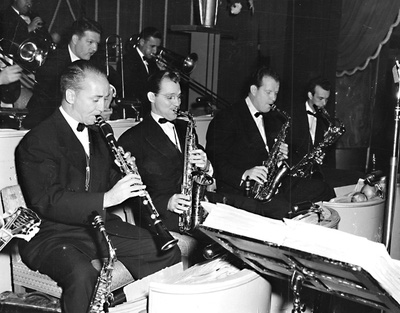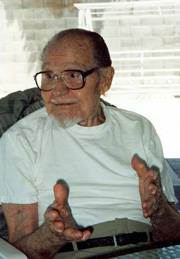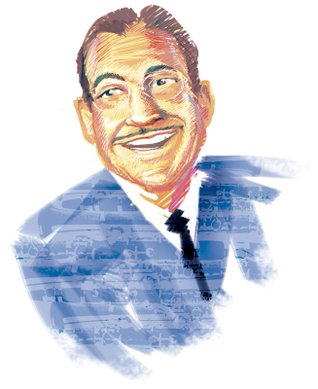Thursday, March 6, 2008 | 2 a.m.

“Doc” Rando, second from left, had a musical career that included gigs in his birthplace, New Orleans, and in Los Angeles and New York. Rando was a Creole musician who played both the saxophone, above, and the difficult Albert clarinet, which he clung to after other clarinetists abandoned it for a simpler instrument. He first studied music in a Catholic grammar school.

Yearning to be a doctor, Rando used his wages from his music to put himself through medical school and had a separate career as an emergency room physician.
When he was 8, his aunt would take him for rides on the riverboats popular in his native New Orleans, and Arthur “Doc” Rando-Grillot would listen with awe to the jazz bands that entertained the passengers.
That’s where he first saw young trumpeter Louis Armstrong, honing the talent that would make him a legend.
“It’s one of the first things I remember,” Rando says.
Rando, legally blind and in frail health, sits in a recliner in his living room and reminisces. He turned 98 on Jan. 23 but this is a belated birthday party. Dixieland jazz clarinetist David Poe and his group perform a friendly serenade for the man the celebrants have long admired.
Doc Rando — few call him anything else — has many admirers.
And many memories. He played clarinet and saxophone with some of the top bands during the Jazz Age and the Big Band Era.
But when the music world slipped into rock ’n’ roll in the 1950s, Rando rolled up the sheet music, put away the clarinet and the sax and changed professions.
“Doc” Rando literally became a physician.
For more than 20 years he ran the emergency room at Southern Nevada Memorial Hospital, which eventually became University Medical Center.
Even Las Vegans who didn’t end up in the ER might recognize his name because of Doc Rando Hall, the intimate recital venue that houses a 3,000-pipe organ. Rando’s friend, Thomas Beam, insisted on the honor when he donated money to build the music center on the UNLV campus.
“Doc was a Creole musician. He grew up in a musical society that used older instruments,” says Ken Hanlon, former chairman of the music department and now director of the Arnold Shaw Popular Music Research Center at UNLV. Rando learned to play the difficult fingering of the Albert clarinet system, not the simpler Boehm system used today. “Everyone started using that, but Doc kept playing the Albert system. Not one in a thousand people today even know what one of the old clarinets looks like.”
But Rando’s pained, bent hands can no longer hold the clarinet. The only thing he plays now is the cassette player, listening to the music that has been so much a part of his long life.
“My interest in music began when I was in grammar school,” Rando says. “I was educated in Catholic schools and you had to take music.”
The family lived in the Upper Ninth Ward, the largest of the 17 wards in New Orleans and one of the hardest hit by the flooding caused by Hurricane Katrina in 2005.
He was always called Doc, even before he got his medical degree. “My maternal grandfather was a doctor, so everyone called me Doc,” he says. His father was a railroad engineer on the Panama Limited, which ran between New Orleans and Chicago. “We were never a wealthy family, but my dad being an engineer, he always had a job,” Rando says.
One of Rando’s closest friends growing up was the great tenor sax player Eddie Miller. Their fathers played in a band as a pastime — Rando’s father played fiddle; Miller’s father, an old-style German button accordion.
“I got to meet a lot of musicians,” Rando says.
There were a lot of musicians, such as Armstrong and cornet player Joe “King” Oliver, to meet in New Orleans at the dawn of the Jazz Age that would dominate the Roaring ’20s.
Rando started out with the violin but switched to clarinet and saxophone. “I didn’t go to an institute like Juilliard or anything,” Rando says with a hint of the New Orleans accent still detectable in his speech. “I studied with individuals — harmony and arranging and all.”
He got his first paying gig at 16. “I played in a silent-movie house. Made $3 a night,” he says. “But my really big thrill in music was 1929. I went to New York for the summer to study with Simeon Bellison, a famous clarinetist with the Arturo Toscanini orchestra.”
Rando was named Arthur in honor of Toscanini, a conductor his half-Italian grandfather admired. When Rando went to New York, the Great Depression was looming. Black Tuesday — the stock market crash of Oct. 29, 1929 — was just months away.
“Some of the New Orleans guys I knew were playing in New York with the Ben Pollack Band, which was a big thing in the ’20s,” Rando says. One of them, musician Ray Bauduc, was instrumental in getting Rando lessons with Bellison.
While he was studying clarinet with Bellison that summer, Rando was playing alto sax with the Pollack Band, which included Jack Teagarden, Glenn Miller, Jimmy McPartland, Gil Rodin, Charlie Spivak, Dick Morgan and Benny and Harry Goodman.
Rando played in big bands led by Miller and Jimmy and Tommy Dorsey, and he toured with what was left of the Pollack Band when it became Bob Crosby and the Bob Cats. His last gig with the band led by Bing Crosby’s brother was in 1951.
“After Doc left the band, he and three other guys from the group opened a nightclub called Club 47 — 47 is the number of the musicians local in Los Angeles,” says Maynard Sloate, former entertainment director at the Tropicana and show producer. “All the musicians in town used to go over there and sit in.”
Rando was on the board of the musicians union in Los Angeles. Max Herman, another former member of the Crosby band, was president of the local for 25 years. He and Rando are believed to be the only surviving members of the band.
For 30 years, Rando followed the music, but medicine continued to hold a fascination for him. His routine over the years had been to play music for a while to earn enough money to go to college and medical school for a while.
He finally earned his medical degree from a Mexican university in 1956 and moved to Las Vegas to practice. While waiting a few months for his Nevada license he performed in relief orchestras. In those days every casino had a house orchestra, and relief orchestras filled in for them on their nights off.
When he went to work in the emergency room Rando didn’t entirely give up performing. On Sundays he would relax by playing with a Dixieland jazz band at the Royal Inn (now the Greek Isles).
David Poe, who plays almost any musical instrument but is known mostly for his clarinet and his love of Dixieland, met Rando almost 30 years ago.
“I met him when I first came to town and, both of us being clarinet players, we struck up a friendship,” Poe says. “I’d get him to sub jobs for me, and he was an ER doctor. I don’t know how he played as well as he did without playing all the time, but he did.”
The emergency room was a busy place — only a couple of doctors without the technology available today.
“People would ask me if I was a specialist. I said an ER doctor is a specialist in anything that walks through the door,” Rando says. “We’d stabilize them and then send them on to the specialists.”
In the midst of it all Rando had a couple of families — his second wife, Mary, died in 1995. He has a son in Glendale, Calif., where he owns a recording studio. He has a daughter who lives in Anchorage, Alaska, with her husband. Rando has four grandchildren and eight great-grandchildren.
He has no regrets about giving up music for medicine, no regrets about any part of his life.
“I was never bored.”


Join the Discussion:
Check this out for a full explanation of our conversion to the LiveFyre commenting system and instructions on how to sign up for an account.
Full comments policy